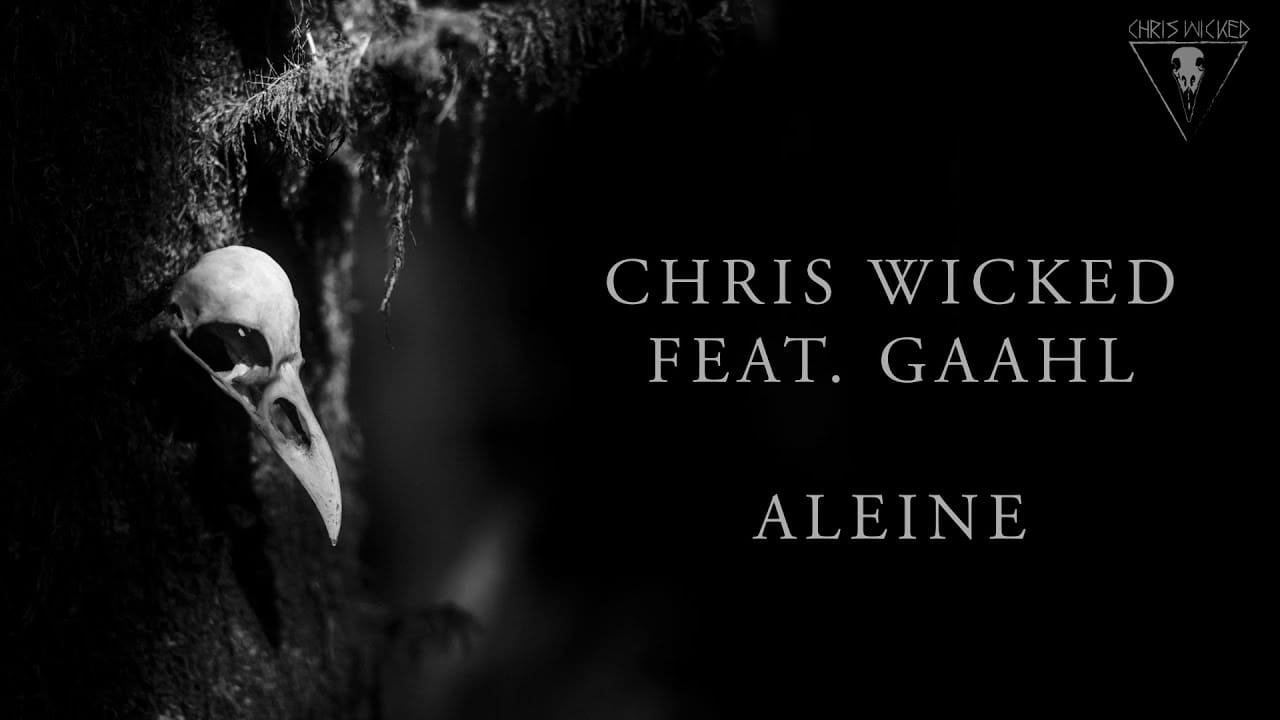After a career with Malice In Wonderland, Norwegian singer and songwriter CHRIS WICKED has now released his solo debut, „Aleine“. Although this is musically far from Black Metal, it features guests like Gaahl, Hoest and Niklas Kvarforth. How it came about, what the Norwegian lyrics are about and what kind of model „Aleine“ would be if it were a car, CHRIS WICKED tells us in the interview.
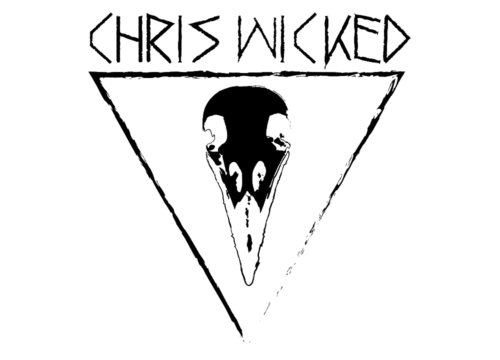
Hi and thanks a lot for taking time for this interview! I hope you’re doing well in those strange Corona-days …
It’s my pleasure Moritz. Strange times indeed, but all in all I’m doing well and luckily Norway is a country that has done fairly well compared to many others. So, I don’t feel I have any reasons to complain although I’m certainly looking forward to things normalize so we yet again can socialize, travel and, of course, play concerts!
How are things going with Corona in Norway at the moment?
The society is slowly starting to open up a bit more these days, more and more people are getting vaccinated so there’s a little bit more optimistic atmosphere at the moment. The worst is behind us, and even though we’ve had many setbacks lately, with several lock downs, we are all starting to see the end of this, luckily.
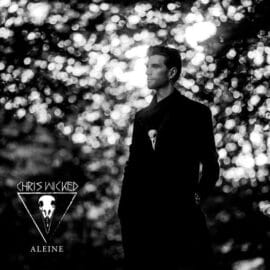 Let’s change the subject and talk about music: Your debut came out a few weeks ago. Many musicians don’t even listen to their music themselves. When was the last time you listened to the album?
Let’s change the subject and talk about music: Your debut came out a few weeks ago. Many musicians don’t even listen to their music themselves. When was the last time you listened to the album?
I did listen to it the weekend it came out, both on vinyl and on Spotify in my car. That was the last time. Of course, I have heard the record so many times now during the whole process, and we also played the songs live with 3 hometown gigs to celebrate the release, so I don’t have the need to put it on. But whenever I hear one of the songs, on radio, or something like that, I feel that I’m still not tired of the songs. That is a very healthy sign in my mind.
Are you satisfied?
Absolutely, I’m very pleased with the result and the whole process. I feel it’s a very strong debut album, and we now have a good foundation we can build on. The feedback’s been quite wonderful. And especially the lyrics seems to resonate with the Norwegian people. I spent allot of time working on the lyrics and treat them more as poems than song lyrics, so I am glad to see that people actually pay attention. It’s also nice to see that the music reach so many different kinds of people. Both singles’ been aired on national radio also so that’s cool.
You sing exclusively in Norwegian. What are the lyrics in general about?
The songs are quite dark, the lyrics more than the actual music. All my life melancholic songs have resonated more to me then happy music, so this kind of song writing is what feels most natural. Loneliness and general dark emotions, but also the spirit of nature and the animal within are some of the lyrical themes on this album. But I try to write about it in an interesting way, using allot of metaphors for instance, so every individual can draw their own conclusion, maybe based on their own experience. People ask me why I write such sad song when I have a quite joyful personality. The answer is I do not know. It’s just the way I write. One said I paint pictures with words, and I think that was a nice way to put it.
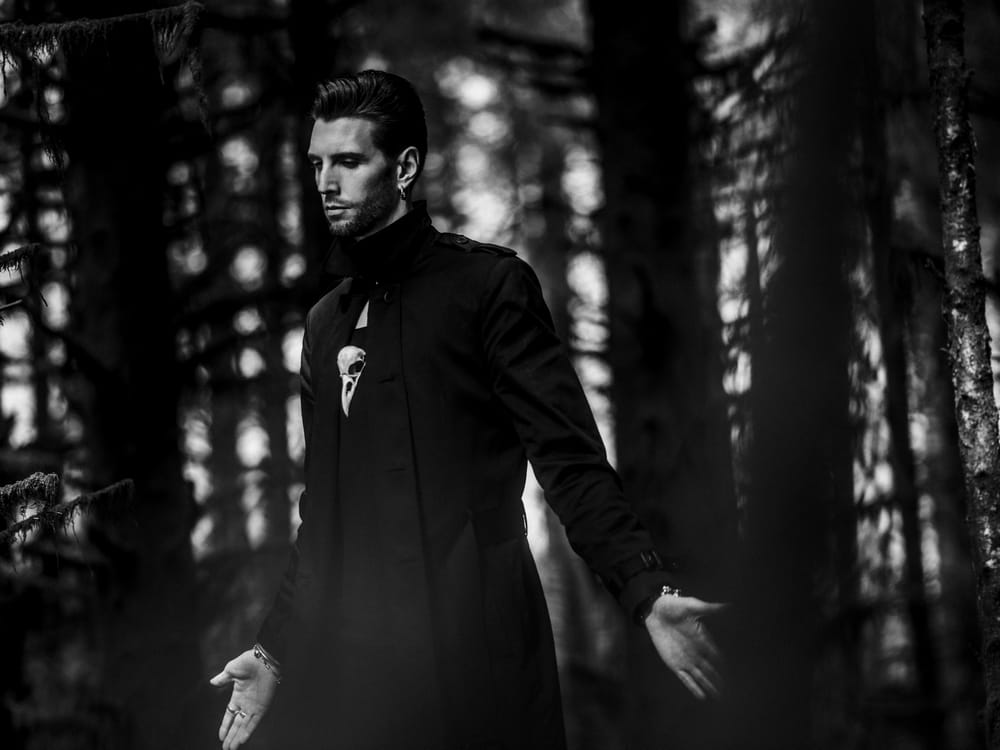
Using Norwegian as language makes the songs sound extra Scandinavian, of course, but very few people in the world understand your lyrics. Does that bother you?
After writing English for 15 years with my old band, Malice in Wonderland, this is something new for me. But with diving into my own language new doors opened as a lyricist and exploring my own dialect was very interesting. After singing in English for so many years, it felt strange at first, but very quickly I felt right at home, so I will probably stick with it.
With singing in Norwegian I know the marked shrinks and that I do alienate many music lovers that potentially would become fan of these songs. And also, fans of my old band. Norway is a small marked and we close many doors with this decision. However, being an artist is about being true to yourself and choosing what feels right and what comes naturally, therefor it doesn’t bother me. I still think one can really like these songs even though one doesn’t understand the words. We have been talking about translating the lyrics into English though, so everyone can understand them, and maybe we will do that at some point.
Can you tell us whats the meaning of the albumtitle, „Aleine“?
“Aleine” means “Alone”. I felt it was a fitting album title for several reasons. First and foremost, some of the lyrical themes dwells somehow around loneliness on this record. Not always as a bad thing, but still, the whole record has that solitary feel to it. Also, it was my first album as a solo artist. In addition, we have the Covid19 pandemic going and allot of people including myself are spending allot of time alone. So, I felt there was no way around, the album had to be called “Aleine”.
And what is „Bergen, Bergen“ exactly about? I think I can hear/understand the words Lucifer and Nattefrost?
The song is about my hometown, Bergen, I’m very patriotic of my hometown. I really like the vibe and the mentality of the people. Also, the urban feel combined with the fjords and the surrounding mountains, I find the diversity very interesting. It was something I had to do. It was important for me to not do it in a cheesy way, and from the feedback it seems like we succeeded, luckily.
The word “Lucifer” is there yes, actually the sentence is “Devil dance in Lucifer’s town”. It’s a reference to the first two songs of Malice in Wonderland’s debut album, („Lucifers Town“ and „Devil Dance“) so it’s a little nod to those who have been following me for years. Also, Bergen is known for being a quite occult city, so that fraise has several meanings to it. Nattefrost means night frost, as Bergen is a cold city with allot of weather…
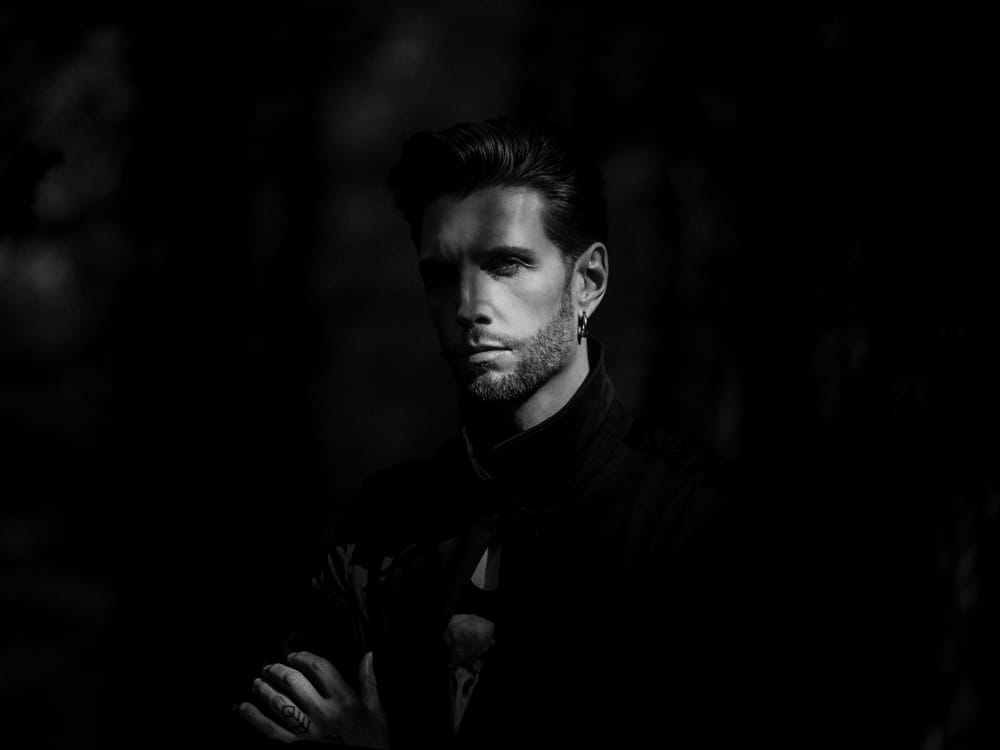
The album contains guest contributions from „members of Gorgoroth, Taake, Gaahls Wyrd and Shining.“ When an album is advertised like this, you would think of black metal – but of course you would be completely wrong. Isn’t that a bit misleading? Did you also get „negative“ feedback from disappointed black metallers for that?
I don’t think it’s misleading. It’s never stated anywhere that I am a black metal artist. The musicians included are friends of mine and it’s just been natural for them to be a part of it. Not because they are from the black metal scene, but because they are great musicians and creative artists. It’s more of a coincidence that they are all from that scene, it wasn’t planned beforehand that this album would include so many guests from that particular sub-genre, it just happened in a very natural and organic way.
All the above-mentioned artists are very open minded when it comes to music and we have more in common that many would think. I also believe that a lot of the extreme metal music fans are more and more into other types of music. I have not gotten any negative feedback from disappointed black metallers, quite the opposite actually. They feel the album is really interesting and the clever ones also understand that dark music doesn’t always has to be hard or fast. (laughs)
Do you listen to Black Metal in private?
Yes, I do, but not as much as i used to. I’m really fond of discovering new music and always checking out new and up and coming artists, but I must admit that when it comes to black metal I mainly listening to old stuff, or new music by established bands.
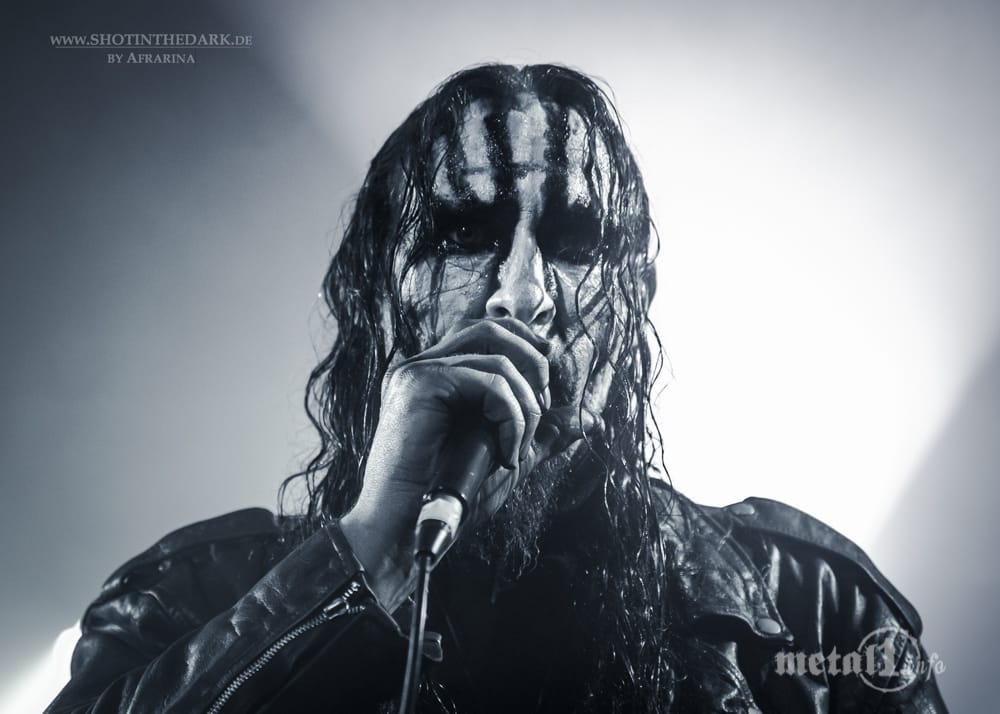
How did these guest contributions from Gaahl, Hoest, Niklas Kvarforth and V’gandr come about?
Kristian „Gaahl“ Espedal and I have been good friends for about 20 years. The whole thing was very natural. I really felt the song “Aleine” was a tune that would fit his voice. One nigh we were hanging in his gallery, drinking wine, as we often do. I played him the song and asked if he would like to contribute. He really loved the track and said yes immediately and wanted to hear the song over and over. So that night he started the process of how he wanted his part to sound.
Niklas I actually met in Bergen through a mutual friend (Hoest of Taake) and we became friends. I can’t remember when we first met, but it’s many years ago now. When I wrote “Når Allting Svartner” I started to think of Niklas, how he would sound on this track and I was certain his voice would really lift the song. As with Kristian I really love Niklas’ clean voice. I wanted him to do the second verse, sing the same as I do on the first, but with his interpretation and of course singing in Swedish. He loved the song and was very into the idea of a duet between us. In my opinion it worked just perfectly. He really lifted the song and did amazing things with his part.
The other guest musicians are Hoest in addition to V’gandr. Both have been good friends for years and they play bass on the album. Hoest plays on 3 tracks. He has been one of my biggest supporters with this solo band and was also a member of the band for a while. He helped pick some of the songs for the album, like Sørgebånd, he felt strongly that that tune needed to be part of the record, and I took his advice.
V’gandr plays bass on “Aleine”. We actually played together in a metal band for like over 20 years ago, so it was fun to do something together again. I wanted the song to be really bass driven, I like his bass style and therefor wanted to involve him in that song, and he was more then happy to come down to the studio after he had heard the track. He did a great job with it.
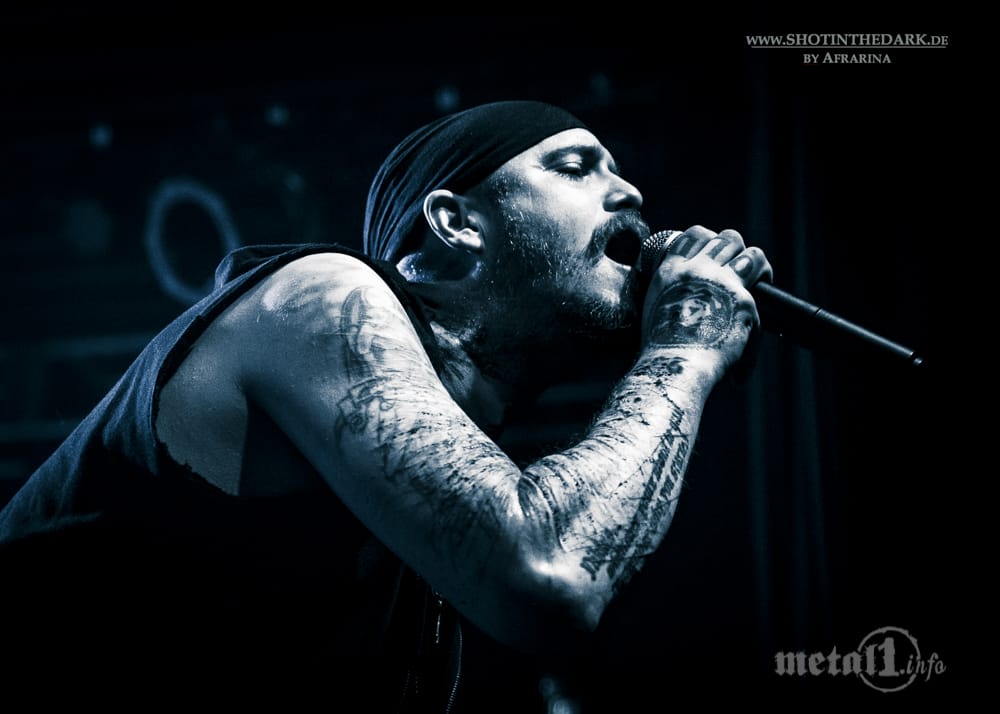
Hoest and V’gandr are contributing on bass. Naively asked: What’s the point of guest contributions on bass? I mean, you have a bass player in your lineup – does it make a difference?
I understand the question, but actually, when we recorded the album, we didn’t have a bass player. At an early stage Hoest was part of the band as a bass player but had to quit since Taake and Gorgoth was touring so much. When it came to recording the album, it was really natural to include him. He really understands where I want to go with the songs and he’s a very clever bass player. As I mentioned, V’gandr has a cool way of playing the bass and I knew that he would come up with something great for “Aleine” and he did. Since the album was recorded, our drummer Eskil Sæter has switched to bass and we’ve now recruited Marius Mathisen as a permanent drummer. My philosophy is if I’m going to have guest artists involved it’s because they can really do something with the song, something me and the band cannot do. I only work with people I respect as people and artists, people who are creative and understands my vision. This goes also with others who are part of the project, like producers, photographers, designers, video makers and so forth. Because we did it this way, I find both the process and the result to be quite magical.
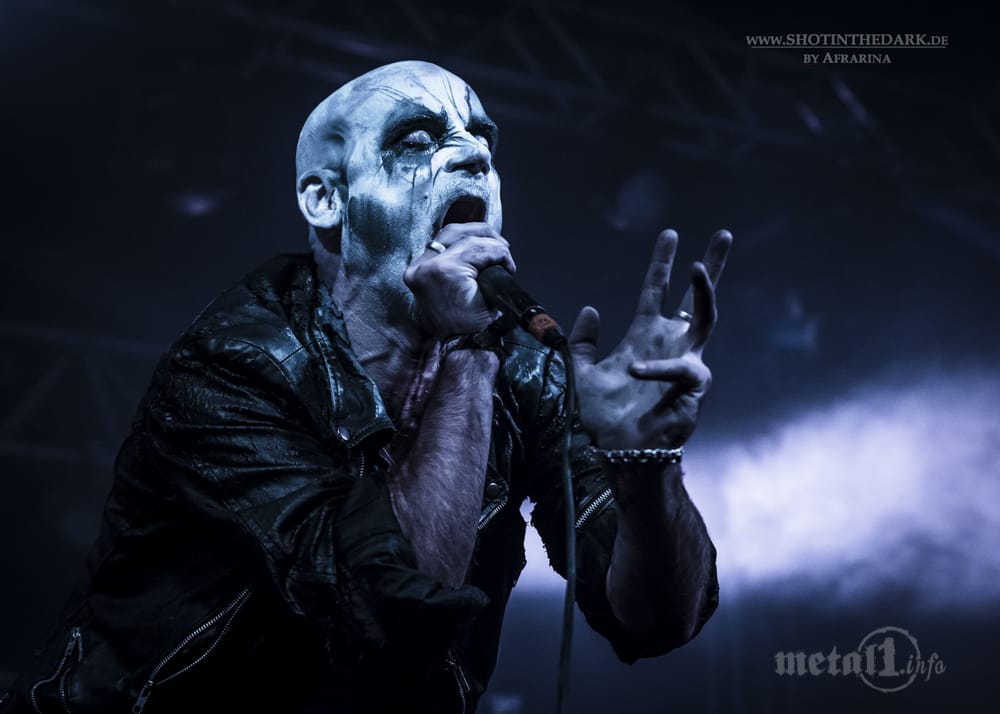
Then how did the collaboration go – did you meet and work on it together, or did they send you their tracks? How much freedom did they have in what they did?
When it was time to record Gaahl’s voice, he wanted to use his producer Iver Sandoy who produced the Gaahls Wyrd album. Kristian likes to record early in the morning, like 5 or 6 am, so I was not present. He called me around noon and said now I could come. I headed straight to their studio, sat down, and was blown away of what they had done. I had ideas for how I wanted it to be, but he totally changed it up, I really loved what he did with it.
With Niklas it took some time for him to record his vocals. He lives in Eastern Europe now and the first producer we booked actually committed suicide just before recording. Always some controversy when Niklas is involved you know… We then booked another studio; he sang the song and sent the tracks to us. Also he did really unexpected things and that’s what I love with collaborations like this
Hoest and V’gandr both came to our studio, at the same time, and we spent the whole day laying down the bass tracks. All guests had a lot of freedom, I do admire them as artists, and the key was to get them to put their stamp and creativity into the music, and they did it perfectly in my mind.
How did the song material come about in general – in which situations are you especially creative?
It’s quite the same process with all the songs. Most of the time I create the songs in my head. Complete songs. Then the melody inspires me to write the lyrics. After that it’s time to figure out the chords and so forth, which I do on my piano. I then take the song to our rehearsal studio where I teach the song to the band and we start arranging it together. The situations where I’m most creative is actually when I walk outside, it can be in the streets or in the forests. Melodies just start popping up in my head, I can’t really help it. I then record them on my phone, so I won’t forget.
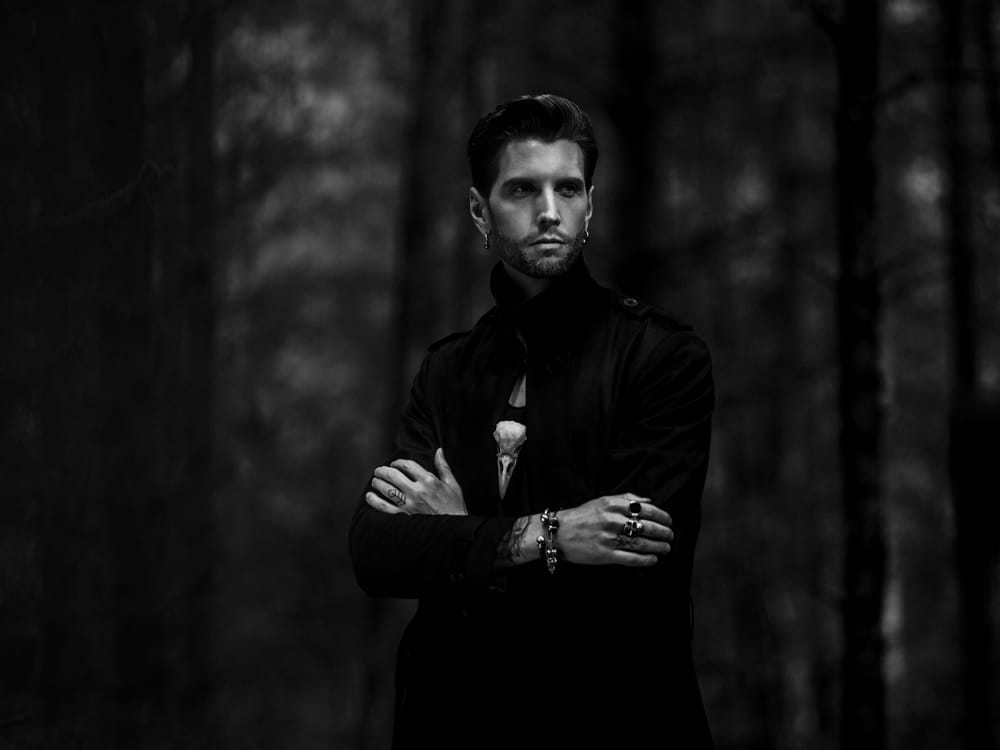
As comparison bands Sisters of Mercy, Nick Cave, David Bowie and Depeche Mode are mentioned – personally the album reminds me also very much of Seigmen. Do you think that fits?
Actually, Seigmen are from Norway and yes, it absolutely fits in my mind. It’s not an inspiration for me, but it can certainly be used as a reference. One of the few melancholic, dark outfits from Norway, that also sings in Norwegian. Thanks, I think we should start using them as a reference from now on. (laughs)
There was also a remix released for the album’s title track – what fascinates you about remixes, and who made this concrete one?
Many remixes are without a purpose, so if someone going to remix a song, it has to make sense. With the title track it made sense and I’m really pleased with the result. Anders Vaage, who I used to play with in Malice in Wonderland back the in day is a great producer (check out his work with Bismarck) and is the man behind this remix. It’s a cold, minimal electropop version and we’ve received great feedback for it. In fact, Anders and I will continue to collaborate, releasing original songs under the The Sprawl banner, because of this experience. When remixes are done well it fascinates me, but many times it doesn’t really make any sense. Carpenter Brut did a great remix of Ulver for instance. That’s a good example when it’s done right. By the way, we will release another remix soon, of the song “Sørgebånd”.
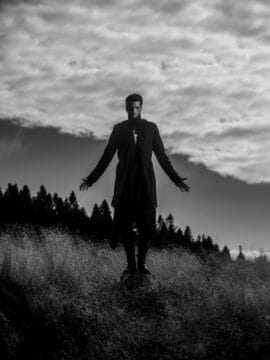
Besides the music – did you use the concert-free time to get a new „Corona hobby“? What do you do with all the free time that has been created by the loss of shows?
I can’t say I have gotten any new hobbies during the pandemic, but I have dived into my exiting hobbies like wine, animals and also been writing allot of new music for both CHRIS WICKED and The Sprawl.
Thank you very much for the interview. Let’s wrap it up with our traditional brainstorming:
A lesson learned from the Corona crisis: Appreciate what you have.
Rainy days: Red wine and writing/listening to music.
Last album you listened to: Ulver – Flowers of Evil
Darkthrone: My favourite Norwegian black metal band together with Burzum. Also Ted is a great guy.
If „Aleine“ were a car, what model would it be? A black 1967 Ford Mustang GT Fastback. Classy, timeless, and unique.
Once again thanks for your time. The last words are yours:
I hope people will take the time to check out our music, even if it’s in Norwegian. If you like physical releases, I’m happy to say that in addition to the CD version, we have released a very nice white vinyl. Go check it out. Thanks for the attention.
Dieses Interview wurde per E-Mail geführt.
Zur besseren Lesbarkeit wurden Smilies ersetzt.
